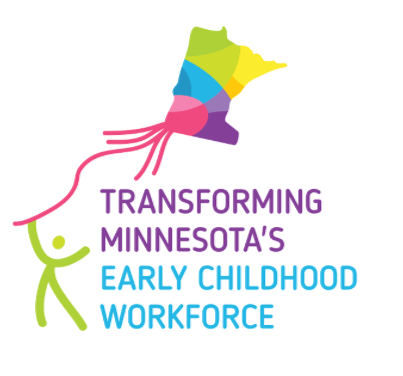By Christa Anders, Coordinator, Transforming Minnesota’s Early Childhood Workforce

I am so looking forward to 2021!! Despite a rough start to the year, I am hoping that science will help bring an end to the global pandemic, that our economy recovers, that people who lost their jobs can find meaningful and well-paying employment, that young people – from infants to college students – can return to their classrooms, that we restore faith in our democracy, and, of course, that stakeholders and policymakers make the needed investments to ensure that all children have access to high-quality, affordable early care and education and that our early childhood workforce gets the recognition and compensation they so very much deserve.

Some people say that early educators do their work out of love for children, and that is why they chose to be in the field, even knowing that they would not make a lot of money doing it. Of course, early educators enjoy working with children. But that does not mean that they should not be recognized for the critically important work that they do building the brain architecture and social-emotional foundation of our next generation and be compensated fairly. Despite their importance, right now early childhood educators in Minnesota (almost all underpaid women including substantial numbers of women of color) earn an average of only $11.44 per hour, work long hours, receive few benefits and struggle to meet their own families’ needs. With the low wages and benefits, there is little incentive for early educators to invest in formal training and qualification. As a result, childcare programs report problems finding qualified staff. Yet we know that a quality early learning experience builds the foundation for lifelong academic success.
So why does increasing compensation for the early childhood workforce matter?
- Low compensation means that many people, who would be wonderful educators, never even consider entering the field.
- Low compensation means that many early educators leave to earn more money and have access to important benefits like paid-time-off and health insurance. The early care and education industry has very high turnover rates which is hard on children, families, educators and programs.
- Low compensation makes it hard to deliver on the promise of a high return on investment in high-quality early care and education.
- And low compensation is fundamentally and morally unfair to the hard-working early educators, the vast majority of whom are women, including many women of color. There are huge gender and racial justice issues that need to be rectified for the early childhood workforce.

It is important to know that when we talk about compensation for early childhood, we are talking about all early care and education professionals including educators in Head Start, child care settings, preschool and licensed family child care. While educators who work in a family care setting don’t generally receive a paycheck or have wages they still generate income that most of them use to support themselves and their families. Licensed family child care providers are small business owners and so they earn revenue, hopefully have a profit, and then take an owner’s draw or a salary. We use the term compensation to include the money and benefits that all early educators receive for the work that they do.
Minnesota policymakers have recognized the inherent problems of low compensation and have provided a variety of financial relief strategies over the years. These strategies have included things like the Parent Aware Bonus Incentive program implemented by Think Small and Generation Next in 2017, proposed tax credits (never passed by the legislature) as well as the REETAIN bonus program run through Child Care Aware of Minnesota. Other states have tried temporary or one-time solutions like wage supplementation, scholarships (like Minnesota’s TEACH program) and loan forgiveness. These are important and proven programs that have helped to keep some educators from leaving. However, they are not true compensation reform. Compensation reform is not temporary or a one-time occurrence and includes things like an actual livable income, benefits, pay for non-contact time for planning and professional development and some kind of system to ensure that compensation is commensurate with credentials and experience. Currently, educators who earn their bachelor’s degree see very little increase in their earnings. This, coupled with potentially large student loan debt, means that pursuing a degree in early childhood often does not make any financial sense.
We know we can do better. For the past two years, we have had a team of experts working to “Move the Needle on Compensation.” This work has been supported by a small grant and technical assistance from the Teach Early Childhood® National Center. We looked at what other states have done, talked with national experts as well as early educators in Minnesota, read lots of reports and research articles, explored how other states have used their Quality Rating and Improvement Systems (QRIS) to embed compensation-related indicators and thought through how we can make things work better in Minnesota.

One of the strategies recommended by national experts is to implement some kind of wage or salary scale for early educators that includes parity for early childhood educators with the compensation earned by K -12 educators. Early care and education for our youngest children requires just as much skill and training as caring for and educating older children. Our team has developed a salary scale that aligns with Power to the Profession and the three categories of educators (ECE I, ECE II and ECE III) with teachers who have a bachelor’s degree earning compensation equivalent to K-12 educators. As part of our plan to transform the financing of early care and education (see our website for more details) we need to implement Power to the Profession in Minnesota, support early childhood professionals in earning early childhood credits and degrees and ensure adequate financing so that parents have affordable access to high quality care and education and educators are compensated equitably. We will be sharing our salary scale in the coming months along with our financing recommendations and look forward to working with all of you to provide true compensation reform for all of our early childhood educators.
To learn more, read the article Early Care and Education: Profile of an Industry in Crisis, written by some of our “Moving the Needle on Compensation” team members.
Also, check out the compensation reform page on our website.
Learn more about Transforming Minnesota’s Early Childhood Workforce at www.ecworkforcemn.org.








